
RSC Advances is excited to launch a themed collection entitled “Nanocatalysis”, which is Guest Edited by Professor Anil Banerjee (University of Connecticut), Professor Steven Suib (University of Connecticut) and Professor Koustuv Ray (Indian Institute of Technology Kharagpur)

| Nanocatalysis represents an exciting subfield in nanoscience and nanotechnology which involves the use of nanomaterials in the research fields in physics, chemistry, biology, medicine and particularly catalysis. They are defined as substances in the shape of spherical dots, rods, thin plates, or any irregular shape with a cross section of less than 100 nm. Even subnano-sized materials (nanoclusters, diatoms, single atoms) are preferably used as catalysts for a wide variety of homogeneous and heterogeneous catalytic reactions. Along with significant advances in nanomaterial design and synthesis assisted by machine learning, in-situ/ex-situ characterization techniques, and computational chemistry, the past several decades have witnessed a flood of research activities in this rapidly evolving area with most of the studies focusing on the effects of size, shape, chemical composition and morphology on catalytic properties and performance.
Nanocatalysts can potentially bridge the gap between homogeneous and heterogeneous catalysts, and offer better promise for activity, selectivity, stability, efficiency, atom economy and reusability. By controlling the size, shape, spatial distribution, surface composition, and electronic structures, the properties of nanocatalysts could be tweaked for new applications in chemical reactions. Interestingly, nanocatalysts have a wide range of applications including environmental and automobile pollution control, renewable energy, alternative fuels, polymerization, and design of novel catalytic processes and reactions. The types of nanocatalysts include carbon nano tubes, nanowires, nano composites, nano porous materials, low-dimensional materials (including 2D materials) monometallic, bimetallic and oxide nano catalysts. Broadly, the three classes of reaction domains namely thermal catalysis, electrocatalysis and photocatalysis, are going to be highlighted to showcase research directions towards environmental and energy related challenges.
This special themed collection aims to provide a platform to showcase the recent progress and challenges in the field of nanocatalysis. The way forward and novel techniques to overcome activity-stability and activity–selectivity trade-off are provisioned to broaden the scope.
We invite submissions that contribute to the advancement of knowledge in the broad field of nanocatalysis, with particular emphasis on the following broad topics. To keep the focus on nanocatalysis, research articles without application to nanocatalytic reactions will not be considered for this themed collection.
• Synthesis, characterization and reactions in thermal catalysis, photocatalysis, electrocatalysis • Automotive and air pollution nanocatalysis • Structure-activity relations, confinement effects, dynamic evolution of active sites • Mechanism and catalytic cycles of nanocatalysts • Theoretical modelling (First-principles based DFT calculations, catalyst screening and exploring new and alternative catalysts by the use of machine learning) on nanocatalysis • Process and product development involving nanocatalysts |
RSC Advances is a gold Open Access journal publishing high-quality research on all aspects of chemistry. Both papers and review articles are welcome. More information on the article types can be found on the journal web page.
The deadline for manuscript submission is 31 March 2026.
All manuscripts will be subject to the journal’s usual peer review process. Accepted manuscripts will be published in a regular issue of the journal as soon as possible and then added to the themed collection on the journal webpage.
RSC Advances’ article processing charge (APC) is among the lowest in chemistry and waivers are also available for authors who meet the eligibility criteria outlined here.
In order to view any deals that your institute may have in place with the Royal Society of Chemistry for Open Access publishing, or to discover any discounts that you may be entitled to, authors are encouraged to use our Journal Finder tool.
Did you know?
At RSC Advances, our themed collections are built in collaboration between our Guest Editors and expert Associate Editors. Our Guest Editors guide the scope and curate the contributions in our collections but all submissions are handled through peer review by our team of resident Associate Editors. This means that as an author you receive a consistent experience, and as a reader you can trust the quality of the science being presented.












